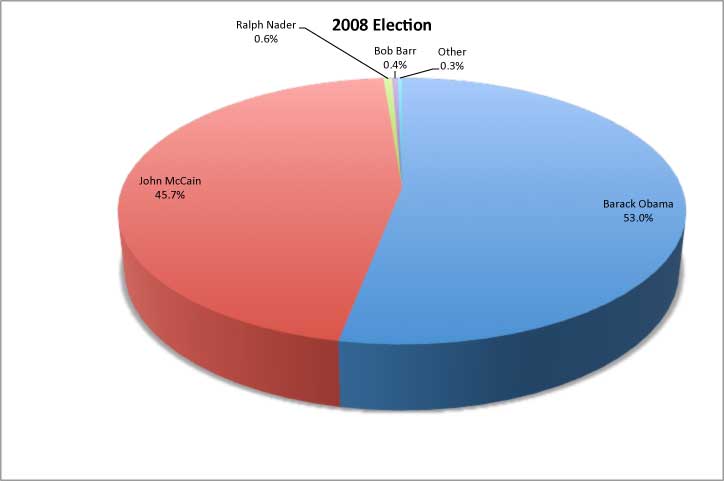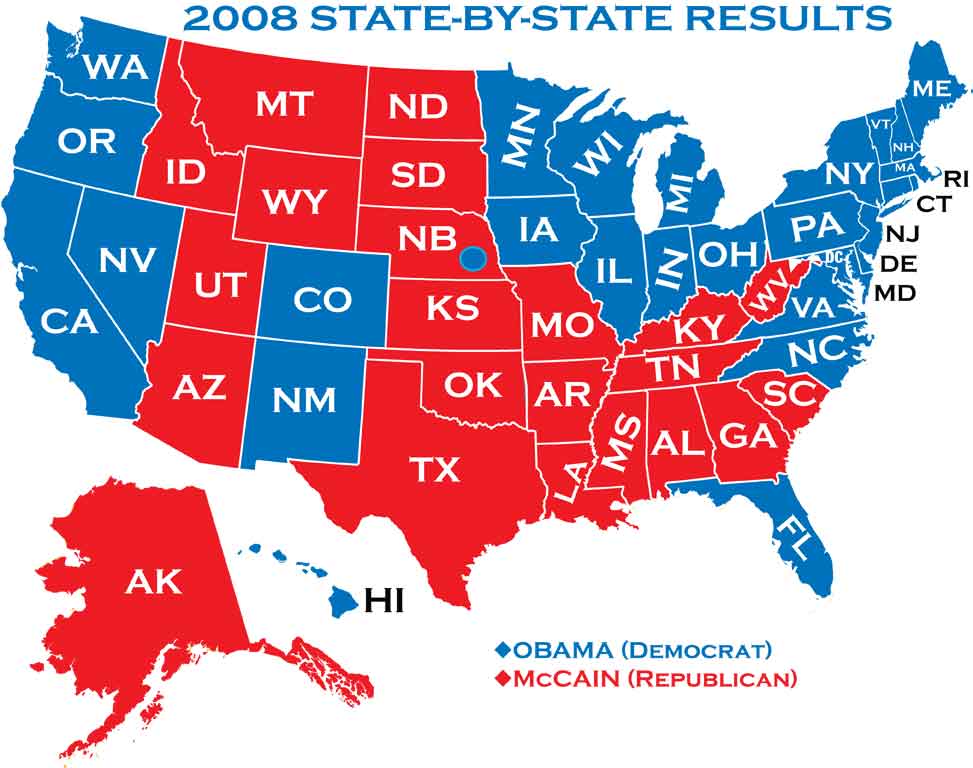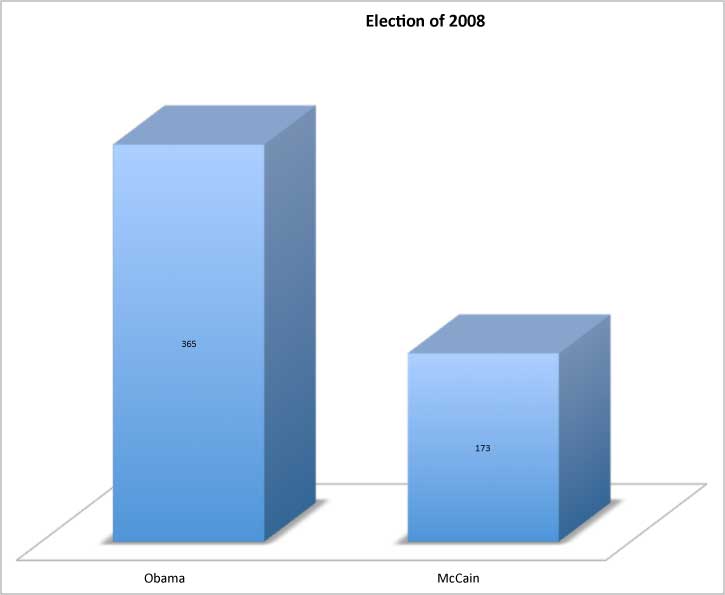2008 Elections Obama vs McCain

Senator Barack Obama won the 2008 Presidential Election. His victory came at the end of the longest, and most exciting election in American history. The 2008 election was the first election in 50 years, in which there was no incumbent President or Vice President from either party competing for the Presidential nomination. The absence of any incumbent encouraged a large number of candidates from both parties to run.
On the Democratic side, the early assumptions were that Senator Hilary Clinton, wife of the former President Bill Clinton, would be the favorite to receive her party's nomination. Clinton entered the Presidential primary race with the highest name recognition of any candidate. She had an established political organization, inherited partially, from her husband, as well as built on her own. A large number of other Democrats announced their intentions to run. Most of the potential candidates were senators. One of the Senators was Barack Obama, a freshman Senator from Illinois. Obama was an African-American, who come to national attention when he gave the keynote address at the 2004 Democratic National Convention. Obama was the only African-American Senator. He was also the only candidate that had been on record opposing the war in Iraq, before the US attack. This was a strong draw among a Democratic primary electorate that was firmly against the war. Obama won the first primary election battle, the Iowa caucus. Senator Clinton revived her campaign with a comeback victory in New Hampshire. The two battled in repeated primary states. Obama made an important strategic decision to compete heavily in many of the smaller caucus states; states that rarely voted for a Democrat in a general election. Securing victories in the smaller caucus states provided Obama with a significant lead in the delegate count in his favor. The Democrats appointed delegates proportionally. Thus, even though Clinton won many of the later primary contests in the most significant states, she was unable to catch Obama's delegate lead. Also, Obama had a superior fundraising operation. He successfully used the internet to build a significant base of small donors.
The early Republican front-runner had been Senator John McCain. However, in the summer of 2007, his primary campaign nearly fell apart. McCain was forced to retrench and begin again. The early leader in the polls was the former mayor of New York, Rudolf Giuliani. ìRudyî Giuliani had high name recognition, due to his stewardship of the city through the tragedy of 9/11. Many questioned whether Giuliani, who was relatively liberal on social issues, could be nominated in the Republican primaries. Giuliani decided not to compete in the early caucuses and primaries. Governor Huckabee, a self-defined Evangelical, won the Iowa caucus. Though Senator McCain won the New Hampshire primary, where he had placed much of his effort. McCain then went on to win the North Carolina primary; the state from which his 2000 efforts against George W. Bush hit a wall. By the time McCain arrived in Florida, he had momentum and the endorsement of the popular Florida governor. McCain handily won the Florida primary. The Republican rule of ìwinner takes allî allowed McCain to build an insurmountable lead in delegates swiftly. As a result, he clinched the nomination. Once both nominees had cemented their party's nominations, Senator McCain suggested that he and Senator Obama jointly conduct 10 Town Hall meetings throughout the United States. The Obama campaign deflected the invitation. Both major parties held their conventions late in the season. The Democrats convened in last August. The Republicans held their convention in early September. Both parties wanted to schedule their elections as late as possible, in order not to limit their spending, in the event they chose to accept public financing. Senator Obama became the first major candidate not to receive public finances since the campaign finance laws were first passed.
Senator Obama selected Senator Joe Biden, of Delaware, to be his running mate. The choice of Biden as a vice presidential candidate was well received. The Democratic convention was considered a success by all observers. At the conclusion of the Republican convention, Senator McCain announced his running mate. That selection was Alaskan Governor, Sarah Pallin. Choosing Pallin was successful, in that it generated enthusiasm with the Republican base (something McCain had not been able to do). However, others questioned whether Pallin had the experience to be President. This blunted much of the attacks on Obama, which centered on his lack of experience.
Coming out of the two-party conventions, most observers believed the Presidential race was close. In mid-September, the United States, and much of the rest of the world experienced a severe financial crisis that required rapid government intervention. Obama's response to the crisis was considered by many, better than McCain's reaction. That response put Obama ahead in the polls. The economic crisis, which had been building for over a year. A record number of Americans lost their homes. These losses made it nearly impossible for McCain to win. Going into the election campaign it was thought that one of Obama's advantages would be his opposition to the war in Iraq, but thanks to a surge of troops that McCain advocated, definite progress was taking place in Iraq. This did not work to McCain's advantage. Instead, it took the issue off the table. In the end, it was economic the issues that dominated the election.
Obama also benefited from his decision not to take public finances. He raised record sums of money. He was able to outspend McCain by a factor of nearly three to one. Finally, the Obama campaign was the first campaign that was indeed successful in bringing out the youth vote. Obama won a decisive victory, carrying all of the swing states. He further won states that had not been won by a Democrat in a generation, such as Virginia and Indiana.
Participation of Eligible Voters 58.2%
Democratic Convention >
>
